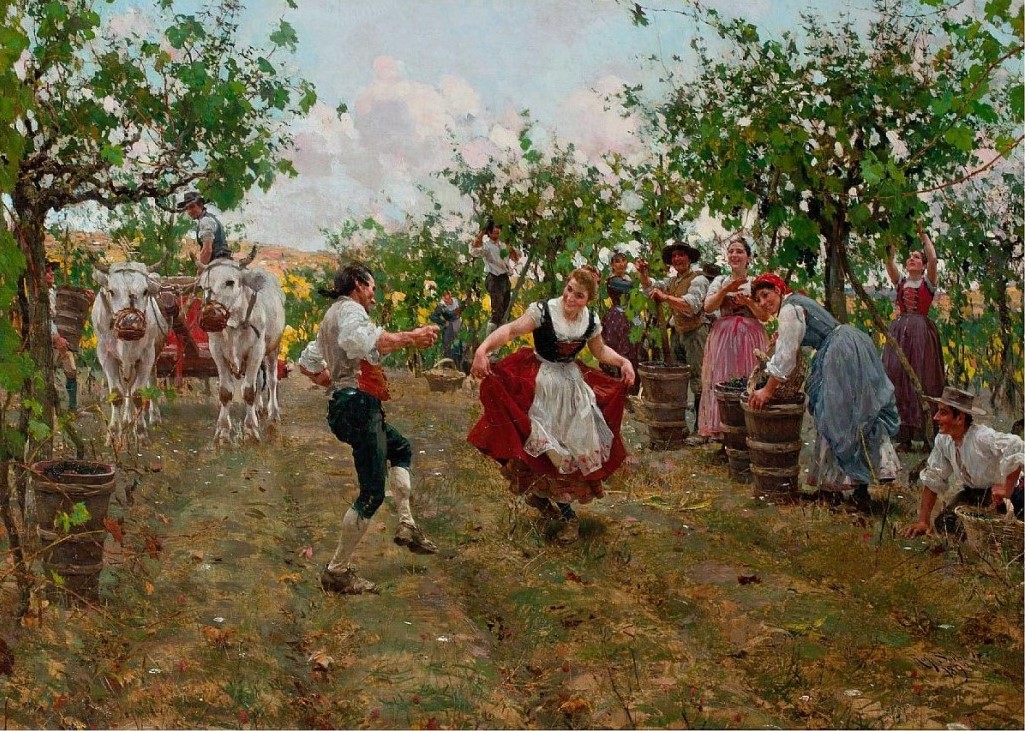
 Federazione Italiana Tradizioni Popolari
Federazione Italiana Tradizioni Popolari
Italian traditions: Wine...wine...life. Proverbs and Calabrian wine
- WTI Magazine #108 Oct 20, 2018
-

 Federazione Italiana Tradizioni Popolari
Federazione Italiana Tradizioni Popolari
The goodness of Calabrian wine has been known since ancient times. One of the testimonies of the distant past, in fact, is contained in a Greek text of the fourth century BC which, translated into Latin, reads: "Bruttia quae vestem et vinum multum et optimum mittit" (Bruzio exports clothing and wine abundant and of excellent quality). Other important references to the wines of Calabria are also found in some writings by Strabone and Plinio.
In addition to this, we have proofs that the most common vines of the region were brought to Calabria by the Greeks who, in the town of Cirò, the ancient Cremissa, built a temple dedicated to Dionysus: the divinity who among the Romans takes the name of Bacchus. Later, in the framework of the Latin imperial culture, also the great Magno Aurelio Cassiodoro di Squillace celebrated the Calabrian wines because "they help the viscera, they heal the wounds, they invigorate the tired heart".
But, besides the many classical and literary references, some of which are mentioned here, the "merits" of Calabrian wine are "celebrated" by the popular masses with significant proverbs that often the folkloric groups of the region report in their stage transpositions. Without wanting to deal with the complex problems of paremiology that are left to specialists, it is perhaps sufficient to go back to what Aristotle said in ancient times, according to which proverbs are "fragments of ancient philosophy preserved among many ruins, thanks to their brevity and opportunity".
As is well known, the proverb, even as a particular form of linguistic experience, is always in use. Its function necessarily becomes that of transferring a particular symbolic material elaborated on the basis of a specific attention to reality. For example, many proverbs have been elaborated and socially accepted in the context of popular festivals. In fact, especially in the past, festivals were moments of intense rituality that, in addition to marking the propitiatory and devotional relations with the divinity, constituted a useful system to reconfirm the social and cultural horizon in which cohesion and its control were institutionalized by unwritten rules but often defined by mottos and proverbs.
Since the second post-war period of the last century, the strong attraction of the industrial economy, the related mechanization of the agricultural world, the abandonment of the land by the laborers and the emigration towards economically developed productive realities have been important causes that have had a profound impact on the survival of the popular culture of the traditional peasant communities in which, in the past, the wisdom of proverbs was a fundamental element of the practical pedagogy of the elderly. In fact, in the process of transforming the production system, the economic-cultural and, at the same time, social systems have also changed.
Therefore, the pedagogical function of proverbs has always become a rather rare fact and has remained an exercise for enthusiasts such as folklore groups that manage to preserve them in the staging of their shows. Moreover, the social context in which, today, the proverb falls is different; in contemporary linguistic practice we find, in fact, other forms of language such as the slogan used in advertising.
In this semiological context of slogans, however, it is worth noting that much has been borrowed from the semantic structure of proverbs that, in the past, have greatly facilitated the social circulation of ideas. Proverbs contribute to "keeping alive and undeformed" a culture from which one comes, meaning something very precious, such as the testimony and faithful interpretation of the expression and of the collective and individual experience.
The general premise on proverbs is the presupposition for a brief recovery of some of the Calabrian paremiological tradition concerning wine, the ergology to produce it, the moments and the occasions to consume it. Therefore, the proverbs reported below are proposed as "little bible" not to be read in one breath, but to be sip like a good wine and to be re-stored often.
HERE IS THE "NECTAR" OF SOME CALABRIAN PROVERBS TO "DRINK" SLOWLY, REFLECTING AT EVERY SIP:
- U mangiara senza vivira è comu 'u tronare senza chiovira (eating without drinking is like thundering without rain). - Pani de nu jornu e vinu de n'annu (bread of a day and wine of a year). - Vinu, vinu, vita mi 'nda vivaria menza cannata (wine is life, I would drink half a tub of it). - Vinu bonu calabrisa non ha bisognu 'e frasca (good Calabrian wine does not need to be advertised). - Quandu 'a tavula è misa, cu non mangia e viva perda 'a spisa (when the table is set, those who do not eat and drink lose the opportunity). - Vinu amaru, tenalu caru (bitter wine keep it very dearly). - Vinu, sozizzi e pani, non fannura i cristiani (drinking wine and eating sausages and bread, men can not die). - Pinnuli 'e cucina e sciruppu 'e cantina (the real medical prescriptions are the meatballs / cooking pills and wine / syrup cellar). - If 'u vinu non t'u vivi stizza a stizza, ti jetta 'nterra comu 'na mundizza (if you don't drink wine by sips, it stretches you out to the ground like rubbish). - Carca bonu 'a zappa 'nta la vigna e scippa la malerba e la gramigna (sink the hoe well into the vineyard and eradicate the bad grass and the gramigna). - A vigna è 'na tigna (the vineyard is a ringworm and requires special care). - Quandu è tempu de zappa e de puta, né cumpara né neputa; quandu è tempu 'e vindignari, tutti neputi e tutti cumpari (when it is time to hoe and carry, you don't see grandchildren or comparisons around; when it is time to harvest, they are all grandchildren and comparisonsi). - Chianta arvuri 'nta vigna: you do not cogghi ligna cogghi fruits (plant trees in the vineyard: if you do not collect fruit you will get wood). - Cui simina 'nta vigna, non meta e non vindigna (whoever sows in the vineyard, does not reap and does not harvest). - ‘A Settembra ogni sipala è taverna (in September every hedge is a tavern). - In Ottobra lu mustu is 'ntra li doghi (in October the must is in the barrels). - In San Martinu, ogni mustu is vinu (the day of the feast of San Martino the must is already wine). - In San Martinu, favi and vinu (the day of the feast of San Martino, broad beans and wine). - Si voi campara anni e annuni, viviti vinu supra i maccarruni (if you want to live for long years, drink wine and eat macaroni). - 'U vinu è 'u sangu 'e l'omu (wine is the blood of man). - Quandu arrivi a la sessantina, lassa ‘a fimmana e vai in cantina (when you reach sixty, leave the women and go to the cellar). - A gutta duna 'u vinu chi ava (the barrel gives the wine it has). - Pe 'a gutta vacanta non ci vò canneddha (for the empty barrel there is no need to put the tap). - Duva c'è bonu stara, c'è bonu campara (where you are well, there is good living). - Ha d'esserera de crita la pignata, mu facia la ministra sapurita (the pot must be made of clay to make the soup tasty). - Pana cu occhi, formaggiu senz'occhi e vinu mu mu ti caccia l'occhi (bread with holes, cheese without holes and wine that fogs your eyes). - Vinu, pana e cipuddha è mangiara de signura (wine, bread and onion is food for gentlemen). - Panza china fa cantara e nò cammisa janca (being full makes you sing and not wear a white shirt). - De' mbriachi e de' figghioli si'appura 'a verità (the truth is known to drunkards and children). - 'U furnu è 'a sacrestia d'a casa (the oven represents the sacristy of the house). - Sparagna quandu 'a gutta è china (save when the barrel of wine is full).
In recalling these proverbs and comparing them to the new advertising languages, it is worth quoting what Pier Paolo Pasolini writes about them: "There is only one case of aberrant expressiveness in some industrial communication languages: this is the case of the slogan. The slogan, in fact, must be expressive, to impress and convince. But its expressiveness is monstrous because it immediately becomes stereotypical and is fixed in a rigidity that is precisely the opposite of expressiveness, which is eternally iridescent and offers itself to an infinite interpretation". At this point a distinction is necessary; unlike the slogan, the proverb has the capacity to function and educate socially while remaining unchanged historically. In other words, the proverb does not communicate with a stereotyped and ephemeral semantic dimension like that of the slogan; the proverb, in fact, is a social constant culturally elaborated, recognized, accepted, employed and diffused by a given community on a collective and individual level.